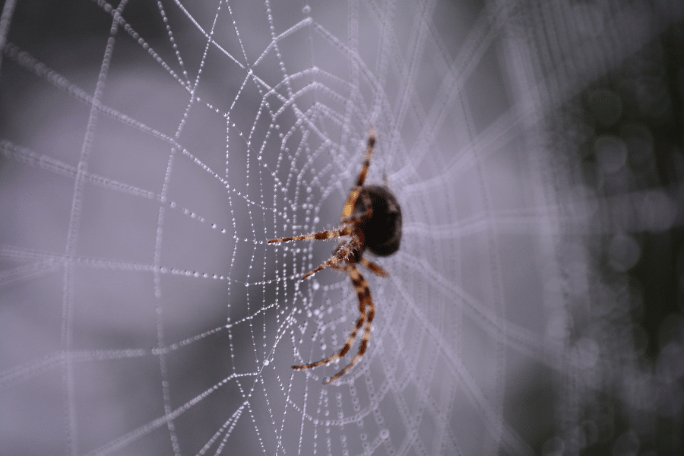Lesson summary
One of the tiniest species affected by the bushfires on Kangaroo Island was the Micro-trapdoor spider. Not everybody loves spiders, but Scientist Jess Marsh wants more people to understand that the functions invertebrates perform are vital for the survival and balance of ecosystems.
Students will use Jess’s evocative piece on The Conversation as inspiration for a creative writing exercising, using descriptive language to describe the spider’s in its natural habitat and its harrowing encounter with the bushfires, in order to encourage people to empathise and care for this crucial little critter.
Learning intentions:
Students will...
- understand the impact of bushfires on the Australian landscape, flora, and fauna
- understand the work scientists are undertaking to protect and preserve the Australian landscape, flora, and fauna in the wake of bushfires
- understand the way animals depend on their habitat for survival
- understand animal food chains
- understand animal life cycles.
Success criteria:
Students can...
- independently research about the life cycle, food chain, and habitat of the Kangaroo Island Micro-trapdoor spider
- describe how the extinction of the Kangaroo Island Micro-trapdoor spider impacts the food chain of other species on the island
- use descriptive and evocative language to write a narrative that communicates their understanding.
Lesson guides and printables
Lesson details
Curriculum mapping
Australian Curriculum content descriptions:
Year 4 English:
- Understand how texts are made cohesive through the use of linking devices including pronoun reference and text connectives (ACELA1491)
- Discuss how authors and illustrators make stories exciting, moving and absorbing and hold readers’ interest by using various techniques, for example character development and plot tension (ACELT1605)
- Create literary texts that explore students’ own experiences and imagining (ACELT1607)
- Create literary texts by developing storylines, characters and settings (ACELT1794)
- Plan, draft and publish imaginative, informative and persuasive texts containing key information and supporting details for a widening range of audiences, demonstrating increasing control over text structures and language features (ACELY1694)
Year 4 Science:
- Living things have life cycles (ACSSU072)
- Living things depend on each other and the environment to survive (ACSSU073)
- Earth’s surface changes over time as a result of natural processes and human activity (ACSSU075)
- Science involves making predictions and describing patterns and relationships (ACSHE061)
- Science knowledge helps people to understand the effect of their actions (ACSHE062)
Syllabus outcomes: ST2-10LW, ST2-11LW, ST2-8ES, ST2-4WS, EN2-10C, EN2-2A.
General capabilities: Literacy, Critical and Creative Thinking
Cross-curriculum priority: Sustainability
Relevant parts of Year 4 English achievement standards: Students understand that texts have different text structures depending on purpose and context. Students use language features to create coherence and add detail to their texts. They create texts that show understanding of how images and detail can be used to extend key ideas. Students create structured texts to explain ideas for different audiences.
Relevant parts of Year 4 Science achievement standards: Students discuss how natural processes and human activity cause changes to Earth’s surface. They describe relationships that assist the survival of living things and sequence key stages in the life cycle of a plant or animal. They identify when science is used to understand the effect of their actions.
This lesson is part of the wider unit of work: Beyond the Bushfires – Primary
Time required: 45 mins
Level of teacher scaffolding: Medium – guide students through the writing exercise by reading prompts, and support them in working independently
Resources required
- Article: The Conversation – I’m searching firegrounds for surviving Kangaroo Island Micro-trapdoor spiders. 6 months on, I’m yet to find any by Jess Marsh.
- Devices capable of independent research, such as iPads or Laptops – one per student
- Device capable of presenting a video to the class
- Lined paper or writing notebook
- Pen/Pencil
- Whiteboard
Skills
This lesson is designed to build students’ competencies in the following skills:
- Communication
- Community engagement
- Creativity
- Critical thinking
- Empathy
- Global citizenship
Additional info
In partnership with The Conversation, the Beyond the Bushfires series brings the words of scientists who are actively involved in research and science communication into classrooms throughout Australia. Students will explore evidence-based research embedded in the context of real-world practice.
Additional thanks to the Ian Potter Foundation, John T Reid Charitable Trusts and The Myer Foundation, for generously supporting the development of these lessons.


Welcome back!
Don't have an account yet?
Log in with:
By signing up to Cool.org you consent and agree to Cool's privacy policy to
store, manage and process your personal information. To read more, please see
our privacy policy here(Opens in new tab).
Create your free Cool.org account.
Many of our resources are free, with an option to upgrade to Cool+ for premium content.
Already have an account?
Sign up with:
By signing up to Cool.org you consent and agree to Cool's privacy policy to
store, manage and process your personal information. To read more, please see
our privacy policy here(Opens in new tab).